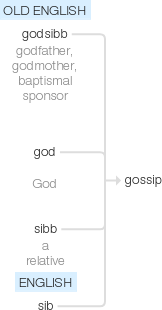Gossip
late Old English godsibb, ‘godfather, godmother, baptismal sponsor’, literally ‘a person related to one in God’, from god ‘God’ + sibb ‘a relative’ (see sib). In Middle English the sense was ‘a close friend, a person with whom one gossips’, hence ‘a person who gossips’, later (early 19th century) ‘idle talk’ (from the verb, which dates from the early 17th century).
wiktionary
From Middle English godsybbe, godsib(“a close friend or relation, a confidant; a godparent”), from Old English godsibb(“godparent, sponsor”), equivalent to god + sib. Doublet of godsib.
etymonline
gossip (n.)
Old English godsibb "sponsor, godparent," from God + sibb "relative" (see sibling). Extended in Middle English to "a familiar acquaintance, a friend, neighbor" (c. 1300), especially to woman friends invited to attend a birth, later to "anyone engaging in familiar or idle talk" (1560s). Sense extended 1811 to "trifling talk, groundless rumor." Similar formations in Old Norse guðsifja, Old Saxon guþziff.
gossip (v.)
"to talk idly about the affairs of others," 1620s, from gossip (n.). Related: Gossiped; gossiping.
